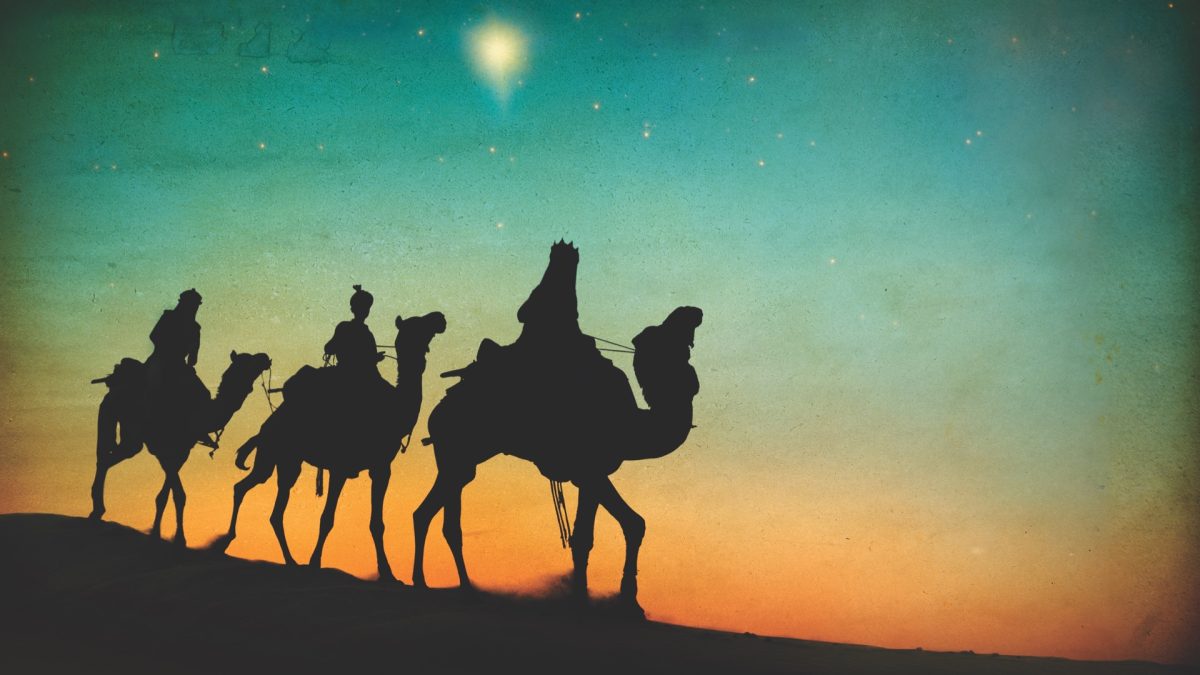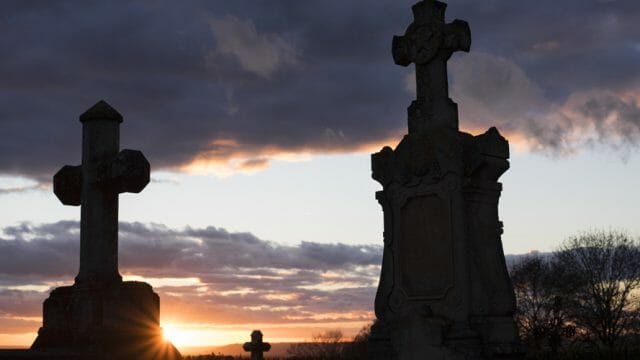Follow the Star

The night was dark and clear. Stars sparkled high above the hills of Bethlehem, where for centuries shepherds had watched their sheep. Frequently the shepherds would keep each other company through the long night, sharing their thoughts and hopes for the future. This night seemed no different as they “talked together of the promised Saviour, and prayed for the coming of the King to David’s throne.”1
Suddenly the still night was broken with a flash of heavenly light! “And behold, an angel of the Lord stood before them, and the glory of the Lord shone around them, and they were greatly afraid” (Luke 2:9).
Seeking to calm their fears, the angel said, “Do not be afraid, for behold, I bring you good tidings of great joy which will be to all people. For there is born to you this day in the city of David a Savior, who is Christ the Lord” (verses 10, 11). After the angel explained how to find this precious Babe, “wrapped in swaddling cloths, lying in a manger” (verse 12), it was as if heaven itself could no longer contain its joy as an unnumbered host of angelic beings sang out in glorious praise: “Glory to God in the highest, and on earth peace, goodwill toward men!” (verse 14).
An Unusual Star
The shepherds were not the only ones who beheld the supernatural light radiating from the heavenly host that night. Nearly 900 miles (1,458 kilometers) to the east, in the land of Mesopotamia, Wise Men, known as “Magi,” noticed an unusual star in the night sky.
These Wise Men belonged to a wealthy and influential class of nobles, honored for their integrity and wisdom. Ellen White tells us, “As these magi studied the starry heavens, and sought to fathom the mystery hidden in their bright paths, they beheld the glory of the Creator. Seeking clearer knowledge, they turned to the Hebrew Scriptures.”2
They were familiar with the prophecy of Balaam, who, himself from Mesopotamia, had centuries earlier declared: “A Star shall come out of Jacob; a Scepter shall rise out of Israel” (Num. 24:17).
Could this be the Star? these Wise Men wondered as they eagerly searched the inspired ancient scrolls. As they studied the prophecies of Isaiah, Daniel, Micah, and more, they became increasingly convinced of the unusual star’s significance and were determined to learn more.
Following the Star
“The magi had welcomed the light of heaven-sent truth; now it was shed upon them in brighter rays,” wrote Ellen White. “Through dreams they were instructed to go in search of the newborn Prince.”3
With precious gifts in hand, the Magi mounted their camels and followed the mysterious star. Traveling by night, they reminded one another of what they had studied, and “at every pause for rest they searched the prophecies; and the conviction deepened that they were divinely guided. While they had the star before them as an outward sign, they had also the inward evidence of the Holy Spirit, which was impressing their hearts, and inspiring them with hope. The journey, though long, was a happy one to them.”4
Surprising Reception
After traveling for several weeks, the Wise Men at last arrived in Jerusalem. They eagerly inquired, “Where is He who has been born King of the Jews? For we have seen His star in the East and have come to worship Him” (Matt. 2:2). But to their surprise, their questions were met with fear and astonishment. No one seemed to be aware of the newborn King.
Even the religious leaders were unable to provide answers. Rather than embracing the inquiries from these visitors from the East, the priests simply rehearsed their long-standing traditions, turning away in contempt that Gentiles would presume to understand the Hebrew Scriptures better than they.
Before long, word reached Herod’s palace, and the Magi were invited for an interview with the jealous king. “Go and search carefully for the young Child, and when you have found Him, bring back word to me, that I may come and worship Him also” (verse 8), said Herod deceptively.
Leaving the palace somewhat deflated, the Magi’s spirits rose again at the sight of the star. Eagerly they followed this guiding light to the Christ Child. “And when they had come into the house, they saw the young Child with Mary His mother, and fell down and worshiped Him” (verse 11).
Through their study of Bible prophecy, and the insight of the Holy Spirit, these men were able to look beyond humble appearances and in Jesus recognized “the presence of Divinity. They gave their hearts to Him as their Saviour, and then poured out their gifts.”5
A Guiding Light
Friends, today we still have the guiding light of Bible prophecy. The apostle Peter assures us: “And so we have the prophetic word made more sure, to which you do well to pay attention as to a lamp shining in a dark place, until the day dawns and the morning star arises in your hearts” (2 Peter 1:19, NASB).6
And yet today, just as in the time of Christ, there are those who doubt His soon return. “Where is the promise of His coming?” they scoff. “For since the fathers fell asleep, all things continue as they were from the beginning of creation” (2 Peter 3:4). But they are willfully ignorant, not recognizing that his coming “is near, even at the doors” (Matt. 24:33, KJV).
“Wise” men and women are studying the prophecies today. These inspired writings reveal the past, the present, and the future. By seeing their exact fulfillment in the past, we can be confident that what is yet to be will take place, exactly as the prophecies predict. Let’s follow this guiding star.
“For yet a little while, and He who is coming will come and will not tarry. Now the just shall live by faith” (Heb. 10:37, 38).
1 Ellen G. White, The Desire of Ages (Mountain View, Calif.: Pacific Press Pub. Assn., 1898, 1940), p. 47.
2 Ibid., p. 59.
3 Ibid., p. 60.
4 Ibid.
5 Ibid., p. 63.
6 Scripture quotations marked NASB are from the New American Standard Bible, copyright © 1960, 1971, 1977, 1995, 2020 by The Lockman Foundation. All rights reserved.








